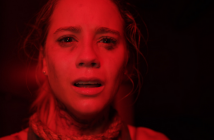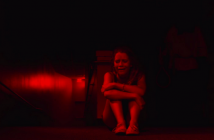Editor’s Notes: Hiroshima Mon Amour & King of the Gypsies are out on their respective formats July 14th.
Hiroshima Mon Amour
 Hiroshima Mon Amour (The Criterion Collection), directed by Alain Resnais, is a major film of the French New Wave movement. Elle (Emmanuelle Riva) is a French actress working on an anti-war movie on location in 1959 Hiroshima. She plays a nurse in the movie-within-the movie. On her final day in Japan, Elle engages in a brief, intense affair with married architect Lui (Eiji Okada). The two discuss Hiroshima’s recent devastation from America’s atomic bomb attack that destroyed most of the city and left survivors mutilated and poisoned from radiation. Newsreel images graphically illustrate the effects of the bomb on civilians.
Hiroshima Mon Amour (The Criterion Collection), directed by Alain Resnais, is a major film of the French New Wave movement. Elle (Emmanuelle Riva) is a French actress working on an anti-war movie on location in 1959 Hiroshima. She plays a nurse in the movie-within-the movie. On her final day in Japan, Elle engages in a brief, intense affair with married architect Lui (Eiji Okada). The two discuss Hiroshima’s recent devastation from America’s atomic bomb attack that destroyed most of the city and left survivors mutilated and poisoned from radiation. Newsreel images graphically illustrate the effects of the bomb on civilians.
Resnais combines eroticism, history, and political commentary in a powerful comment on the convenient blindness to collateral damage that war inflicts. Both Elle and Lui (“She” and “He” in French) carry baggage from their wartime experiences, with the affair helping to heal two emotionally damaged individuals from different races. The film is a brutal condemnation of the attacks (there was a second bomb dropped on Nagasaki days after Hiroshima) that killed 250,000 Japanese citizens. Marguerite Duras’ screenplay deftly weaves past and present, personal pain and public suffering.
Blu-ray bonus extras include audio commentary by film historian Peter Cowie, interviews with Alain Resnais from 1961 and 1980, interviews with Emmanuelle Riva from 1959 and 2003, new interview with film scholar Francois Thomas, 2003 program about the film’s restoration, excerpts from a 1959 Cahiers du cinema roundtable discussion about the movie, and a booklet containing a critical essay.
King of the Gypsies
 King of the Gypsies (Olive Films) stars Eric Roberts in his film debut as David Stepanowicz, a young man torn by three forces: his desire to abandon his gypsy roots, the hostility of his father (Judd Hirsch), and his grandfather’s (Sterling Hayden) wish that he follow him as King of the Gypsies. Previous movies featuring gypsies depicted them as broad stereotypes. This picture takes a look into the fabric of the gypsy society, showing the conflicts of an ages-old race in modern society. The film is based on Peter Maas’ (Serpico) non-fiction book of the same name.
King of the Gypsies (Olive Films) stars Eric Roberts in his film debut as David Stepanowicz, a young man torn by three forces: his desire to abandon his gypsy roots, the hostility of his father (Judd Hirsch), and his grandfather’s (Sterling Hayden) wish that he follow him as King of the Gypsies. Previous movies featuring gypsies depicted them as broad stereotypes. This picture takes a look into the fabric of the gypsy society, showing the conflicts of an ages-old race in modern society. The film is based on Peter Maas’ (Serpico) non-fiction book of the same name.
Though David tries to make a life for himself in New York City with WASP girlfriend Sharon (Annette O’Toole), he is drawn back into family melodrama when his mother (Susan Sarandon) calls on him to save his sister (Brooke Shields) from an arranged marriage. Unfortunately, director Frank Pierson (1977’s A Star Is Born) meanders his way through the film, taking too much time with exposition. Mr. Hirsch tends to “play to the balcony,” and doesn’t really convince, and Mr. Hayden is completely unrestrained as the old gypsy king. These actors could benefit handsomely from restraint. Made six years after The Godfather, the film has many elements of that film, most notably emphasis on the bond of family and its multi-generational conflicts. What’s missing is the layered texture.
Worthy of note is the production design and Sven Nykvist’s photography, which contribute to the picture’s atmosphere. David Grisman’s score is lively and provides appropriate accompaniment to the unconventional gypsy culture.
There are no extras on the Blu-ray release.



